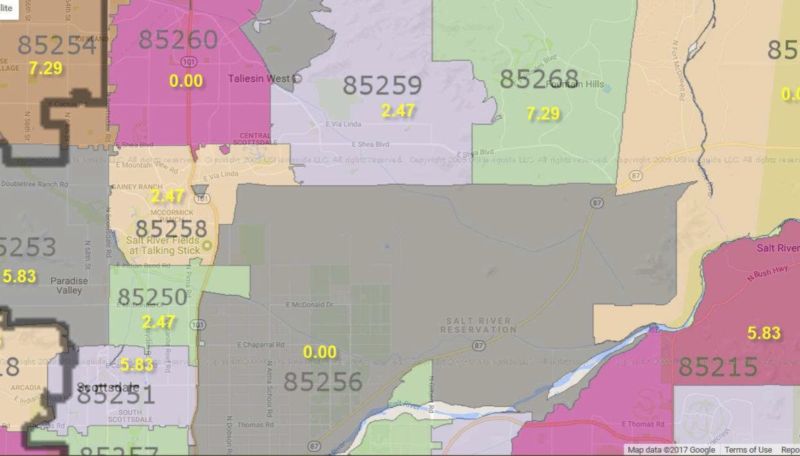
If you’re a DirecTV customer who is annoyed by your monthly “regional sports fee,” get ready to be even more agitated. Depending on what ZIP code you live in, you could pay anywhere from $0 to $7.29 a month (or $87.48 a year) to get the same exact sports networks and watch the same exact teams you watch now.
The news site Consumerist published an extensive report about this on Wednesday. DirecTV owner AT&T has not yet explained in much detail why it charges such different fees to customers who receive the same exact service. In the above image, courtesy of Consumerist, you can see DirecTV monthly fees in Arizona of $0, $2.47, $5.83, and $7.29.
AT&T’s website says the fees vary by ZIP code “due to contractual obligations requiring us to offer multiple sports networks in select ZIP Codes, or in rare instances, a single Regional Sports Network (RSN) that carries games from four or more teams. These local RSN(s) are included in most base packages, but some don’t include RSNs, and are therefore not subject to a fee.”
But DirecTV provides an online tool that allows you to check which regional sports networks and sports teams are available in each ZIP code. According to this online tool, every ZIP code in the above image gets the same network (FSN Arizona) and games played by the same teams (Arizona Coyotes, Arizona Diamondbacks, and Phoenix Suns).
DirecTV began charging the sports fee in some parts of the country in 2012. The company added the fee to more markets over the ensuing years, much to the annoyance of many customers who pay the fee despite not watching sports. AT&T purchased DirecTV in 2015.
DirecTV has a different online tool that lets you check the sports fee amount by ZIP code.
More cities, more oddities
Consumerist looked up the fees in a few other cities and found similar variations. “For example, there’s Minneapolis, where every ZIP code we tested was being charged a fee of $4.53… except two,” one of which was charged $0 while the other was charged $5.83. While the no-charge ZIP code included the University of Minnesota campus, perhaps explaining the lack of a fee, there was no apparent reason for one ZIP code being charged more than all the ZIP codes immediately surrounding it.
Chicago had variations from $5.83 to $7.29 in adjacent ZIP codes that receive the same Comcast SportsNet Chicago channel with access to four local teams. Pittsburgh also had fees of both $5.83 and $7.29 in adjacent ZIP codes that receive the same sports channels and teams.
Philadelphia ranged from $0 to $5.83, which was odd because DirecTV doesn’t carry Comcast SportsNet Philadelphia.
“The strangest DirecTV fee pattern we found was in the heart of Center City Philly, where two small ZIP codes with $0 fees are sandwiched between two ZIPs with $4.83 fees,” Consumerist writer Chris Morran reported. The Consumerist article has more maps displaying sports fees by ZIP code and is worth checking out.
Consumerist sent all its maps to AT&T and gave the company two days to respond. AT&T’s only response was, “content and thus the costs charged by providers vary significantly by ZIP code.”
“Yet that’s simply not true,” Consumerist wrote. “The examples we provided to DirecTV all involve relatively small areas where any regional channels would be the same. For instance, we could find no evidence of any special regional sports channel being beamed only to residents of Chicago’s Logan Square neighborhood.” Consumerist said it sent a follow-up question but received no response.
Ars reached out to AT&T this morning, and the company said, “The fees vary because they are based on a variety of factors, including the number of channels, the content in the channels, as well as the cost to deliver them.”
We were able to verify Consumerist’s data on the AT&T website. We wouldn’t rule out the possibility that some of the DirecTV website’s data is inaccurate, but AT&T hasn’t disputed Consumerist’s findings in the two days since the article was published; the AT&T spokesperson who responded to us today didn’t provide any information that contradicted the Consumerist’s data on pricing by ZIP code.
While cable and satellite TV companies have to pay regional sports networks to broadcast local sports games, the sports network fees charged to customers have been the subject of controversy and lawsuits. A proposed class-action lawsuit recently accused Comcast of falsely advertising low prices and then charging more each month by tacking on sports and broadcast TV fees that aren’t prominently disclosed when customers sign up for service. In some cases, Comcast employees falsely told customers that these are government-related fees or taxes, the lawsuit said. A similar lawsuit was filed against Charter.



